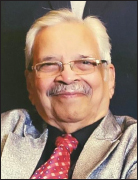Translate this page into:
V.S. Ajgaonkar
Corresponding Author:
Madhuri D Patil
Department of Endocrinology, Baylor College of Medicine, Houston, Texas
USA
madhuri_gole@hotmail.com
| How to cite this article: Patil MD. V.S. Ajgaonkar. Natl Med J India 2021;34:54 |

V.S. Ajgaonkar
(7 April 1931–11 August 2020)
Those who knew Dr Vijay Ajgaonkar may find this single obituary note not enough to describe this extremely versatile personality of enormous stature. He was multifaceted not because he touched all the aspects of life but because he was deep into the details of each of them. Being one of the finest general medicine physicians of his generation was one of those virtues. He was an influential teacher, a creative theatre personality, a fine artist, an effective counsellor, a cogent healthcare activist, a powerful writer and a well-founded supporter for so many around him.
An extremely inquisitive person, he never stopped learning. One would be perplexed to find how he managed to keep up-to-date with medical practice guidelines both in general medicine as well as in diabetes mellitus. He went on to do a PhD in Sanskrit when he was in his 8th decade of life. He knew so much about science, languages, cultures, nature, history and humans of communities from all over the world, and still this humble human being would give you such a comfort in his presence that you would melt down with his love, his attention and his interest in making your life brighter––whether you were his patient, his student, his fellow worker or a relative of someone he knew! It’s no exaggeration, his agenda was to make people’s lives gold.
Dr Ajgaonkar was born in Sawantwadi, Maharashtra on 7 April 1931 to parents Lalita and Shreedhar S. Ajgaonkar. His father, the famous Dr S.S. Ajgaonkar, then president of Diabetes Association of India, whose work was recognized by the international fraternity in the field of diabetes, had a major influence on Dr Vijay Ajgaonkar. At the very beginning of his medicine career, he decided to focus on the public health challenge of diabetes mellitus in India. He obtained his MBBS degree from Topiwala Medical College, Bombay (now Mumbai) in 1957–58, and he finished postgraduate residency training in General Medicine in 1961–62. Through his work at B.Y.L Nair Charitable Hospital and B.Y.L Nair Medical College, L.T.M.M.G. (“Sion”) Hospital, Kasturba Hospital and Raheja Hospital in Mumbai, he taught generations of residents and fellows, many of whom went on to become well-known physicians in India as well as across the globe. He is very fondly remembered by all of them.
Being the founding member of Juvenile Diabetes Foundation (JDF) Maharashtra chapter, he brought in physicians, counsellors, diabetes educators, nutritionists and social workers under one umbrella to create a large, devoted family for people with type 1 diabetes in India. The phenomenal work was through strong efforts and persuasions of him, which never stopped since its beginning in 1980. It has shaped the lives of thousands of youngsters with type 1 diabetes who would fondly call him Aabaa meaning a homely elderly (in Marathi) to look up to and find answers from. The patients and family members from all over India would be so eager to meet Aabaa, at the annual diabetes self-management camp of the JDF India. They found this social activist physician not just a motherly or fatherly empathizer but a strong supporter of scientific ways of understanding and treating diabetes.
His meticulous research while writing his books, including Katha insulinchya shodhaachi (‘The story of discovery of insulin’, a book written in Marathi), was reflection of his stubbornness for finding the truth. He was working till the end on ‘History of Diabetes Mellitus’, and he would not compromise on fact-finding just because he knew he might not be able to complete it.
We lost this gem on 11 August 2020 following a brave and long battle against cancer. He was active until his last days. He would not give in to the cancer pain and continued attending his clinic duties, social activities and writing. He would say meeting his patients and people was a therapy for him. He did not miss calling his students, patients, family members, friends and colleagues on their birthdays or anniversaries the way he would do every year.
Dr Ajgaonkar was a legend and a hero who will be remembered fondly for his selfless service and inspiration to thousands!
Dr Vijay Ajgaonkar And His Zest For Life
Dr Patil′s obituary note is spot-on. Dr Ajgaonkar had a zest for life that was incredible. He was always smiling-unbelievably, even during all the pain that he endured in the last couple of years of his life. Only on one occasion while talking to me, did it slip out from him, ′I am in great pain′. Doubtless, he maintained his enthusiastic approach to life because it helped his patients.
I was unlucky in that our paths crossed formally only on rare occasions in medical school, but his thoughts, actions and deeds set examples to all of us to follow. He was a role model to young physicians.
Not surprisingly, for their book Dissenting diagnosis (Random House India, 2016), which deals with the ills of private medicine in India-including cuts, irrational practice, influence of pharma and insurance companies, etc.-Drs Arun Gadre and Abhay Shukla chose to have the entire first chapter of the book devoted to an interview with Dr Ajgaonkar, to describe his views on the malady and the solutions.
When I met Dr Ajgaonkar last (at Dr Patil′s home, as it turns out), he had a gift for me: a richly illustrated copy of The Prophet by Khalil Gibran. One of the lines from this extra precious book would directly apply to him: ′You give but little when you give of your possessions. It is when you give of yourself that you truly give.′
Sanjay A. Pai
Department of Pathology, Columbia Asia Referral Hospital, Bengaluru, Karnataka, India
sanjayapai@gmail.com
Fulltext Views
1,644
PDF downloads
281




